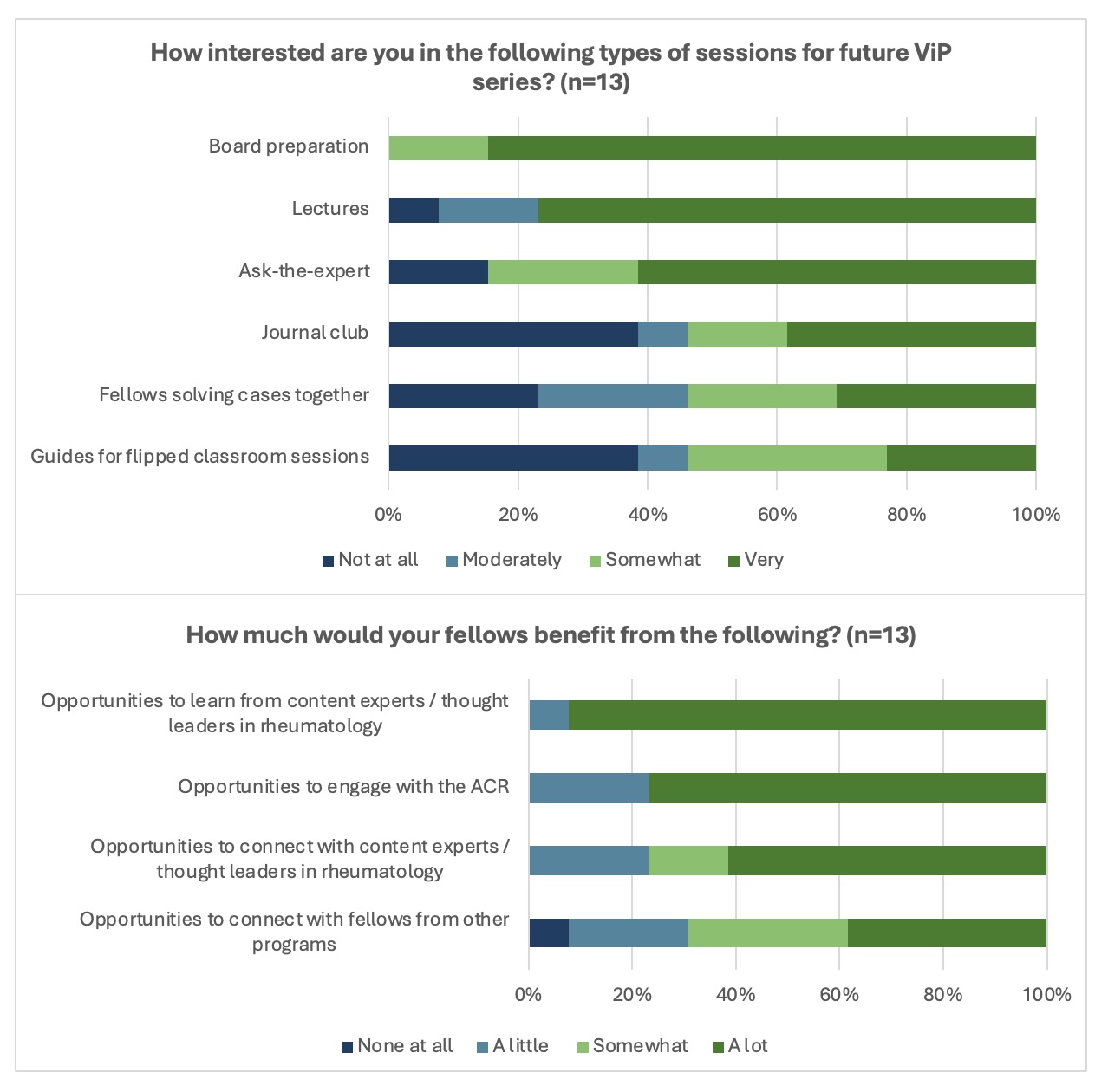Session Information
Session Type: Poster Session C
Session Time: 10:30AM-12:30PM
Background/Purpose: The American College of Rheumatology (ACR) created the Virtual Rheumatology Program for Fellows in Training (V-FIT) in 2020 to provide rheumatology fellowship training programs with virtual curricular resources during the COVID pandemic. V-FIT includes two lecture series: the Virtual Practicum for Adult Rheumatology Fellows (ViP) on foundational topics, and the Virtual Rheumatology Teaching Lessons (ViTLS) on advanced topics. Sessions were delivered via Zoom from 2020-2025, and made available in a video archive. The educational landscape has shifted post-pandemic, prompting this study to re-assess fellowship curricular needs and how V-FIT can evolve to meet them.
Methods: We conducted an online survey of program directors (PDs) and virtual focus groups of PDs and fellows in training (FITs). Invitations were shared with all PDs and FITs via ACR email listservs between August-November 2024. Participants provided electronic consent for surveys and verbal consent for focus groups. Survey results were analyzed with descriptive statistics. Focus group leaders took notes summarizing discussion content. Focus group recordings were transcribed with Trint software. The notes and transcriptions were reviewed to identify themes and representative quotes. The study protocol was approved by the Washington University in St. Louis IRB.
Results: Survey responses were received by 17 of 123 PDs, with a median of 4 fellows per program (range 2-9); 10 PDs completed all questions. Of the responding PDs, 7/17 (41%) indicated they did not have sufficient resources to create a comprehensive curriculum (Figure 1); limitations in faculty expertise and faculty time to lead sessions were the top obstacles identified. ViP sessions were required by 6/13 (46%) PDs, and 5/10 (50%) PDs incorporated 16 or more ViP sessions per year in their curriculum. Several approaches and barriers to ViP utilization were identified (Figure 1). Two FIT focus groups were conducted with 6 total participants, and three PD focus groups were conducted with 8 total participants. Themes and representative quotes are presented in Table 1. Participants expressed interest in lectures ≤30 minutes, with active learning methods that preserve psychological safety, such as anonymous polls and review questions. In both survey and focus group responses, board review content and opportunities to learn from content experts were highly valued, while scheduling conflicts and difficulty navigating the ACR website were obstacles to V-FIT use (Figure 2, Table 1).
Conclusion: PDs of large and small rheumatology fellowship programs expressed a need for curricular resources. Both PDs and FITs would value virtual programming that is ≤30 minutes, promotes active learning while maintaining psychological safety, provides access to content experts, and addresses board exam preparation.
 Table 1: Themes, application to future ViP and ViTLs programming, and representative quotes from fellow-in-training and program director focus groups. ViP = Virtual Practicum for Adult Rheumatology Fellows, ViTLs = Virtual Rheumatology Teaching Lessons, PD = program director, FIT = fellow in training.
Table 1: Themes, application to future ViP and ViTLs programming, and representative quotes from fellow-in-training and program director focus groups. ViP = Virtual Practicum for Adult Rheumatology Fellows, ViTLs = Virtual Rheumatology Teaching Lessons, PD = program director, FIT = fellow in training.
.jpg) Figure 1. Rheumatology fellowship program director survey responses: factors influencing curriculum development and use of the Virtual Practicum for Adult Rheumatology (ViP). PD = program director, ACR = American College of Rheumatology.
Figure 1. Rheumatology fellowship program director survey responses: factors influencing curriculum development and use of the Virtual Practicum for Adult Rheumatology (ViP). PD = program director, ACR = American College of Rheumatology.
.jpg) Figure 2. Rheumatology fellowship program director survey responses: future directions for the Virtual Practicum for Adult Rheumatology (ViP). PD = program director, ACR = American College of Rheumatology.
Figure 2. Rheumatology fellowship program director survey responses: future directions for the Virtual Practicum for Adult Rheumatology (ViP). PD = program director, ACR = American College of Rheumatology.
To cite this abstract in AMA style:
Arneson L, Dimachkie M, Aizer J, Mitchell J, Leverenz D, Dua A, Zickuhr L. An Updated Needs Assessment for the Virtual Rheumatology Program for Fellows in Training (V-FIT) [abstract]. Arthritis Rheumatol. 2025; 77 (suppl 9). https://acrabstracts.org/abstract/an-updated-needs-assessment-for-the-virtual-rheumatology-program-for-fellows-in-training-v-fit/. Accessed .« Back to ACR Convergence 2025
ACR Meeting Abstracts - https://acrabstracts.org/abstract/an-updated-needs-assessment-for-the-virtual-rheumatology-program-for-fellows-in-training-v-fit/
